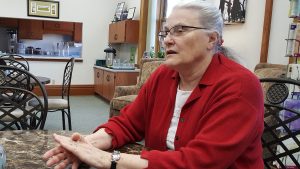
Spiritual Director: ‘We Are All Seekers’
Spiritual direction is essentially companioning someone in his or her spiritual life. Other ways of describing spiritual direction include holy listening, spiritual friendship, sacred journeying.” (Janna Larson, from the website Spiritual Directors International World)
Have patience with everything unresolved in your heart and try to love the questions themselves. . . . Live the questions now. Perhaps then, someday far in the future, you will gradually, without even noticing it, live your way into the answer.” (Rainer Maria Rilke, Letters to a Young Poet)
As a spiritual director, Sister Rose Elsbernd, FSPA, has worked with people of various faith traditions and none. “We are all seekers,” she says. As seekers, we can all benefit from the attentive listening and gentle questioning spiritual direction provides.
Elsbernd, a spiritual director at the Franciscan Spirituality Center in La Crosse, WI, doesn’t see a lot of people under age 30, she said, but not because they aren’t seeking. College students, for example, are both terrifically busy and may be engaged with a different set of questions than those typically explored in traditional spiritual direction.

Young undergraduates, for example, often find themselves wondering, “Who am I in this mass of people,” whereas college seniors are asking, “What’s next in life?” she said.
When young people do come to the spirituality center, typically it’s for programs that involve elements of silence and meditation, she said. Elsbernd cited a monthly program at the center called “The Sound of Bowls,” which involves using historic Tibetan singing bowls to produce sounds that invoke deep relaxation to expand consciousness and facilitate meditation. Also attractive to young people is Taize prayer, she said.
A program that has been popular with younger women is “Grace and Grit,” which focuses on growing from pain. Noted Elsbernd: “There’s a lot of pain out there, and disappointment.” These women may be experiencing a need “to find a way to filter that, to come through it,” she said.
Generally young people are attracted to programs that involve community or relief from anxiety, Elsbernd said, noting, “There’s a lot of loneliness in college.”
Elsbernd distinguishes between spiritual direction and less formal spiritual companionship, noting the latter may be more attractive and appropriate with young people.
Asked what attracts a person to come seeking spiritual direction, Elsbernd said, “For some, there’s that hunger—it’s within all of us if we pay attention. More and more there is a movement toward quieting and meditation. The more people quiet down the more they know they are looking for something and can’t necessarily name it.”
Many such seekers have affiliated with a religious institution in the past, she said, and “may have found it not fulfilling enough, or even hurtful. Some have moved to a wider sense of God and their denomination doesn’t fit anymore. So there’s all those different reasons people are religious but nonaffiliated with a particular community or denomination.”
Elsbernd said the primary purpose of spiritual direction is to address such questions as, “Where is God in your life? Or what has given you meaning and purpose in life? Or what is your passion? It depends on the perspective of the person you are speaking with. A lot of times people have not had an opportunity to tell their story—their faith story, the whole developmental piece of where they understand God. What is their story in life and how is that story continuing in life?”
People may wish to talk about “all of their questions, delights, joys and sorrows as well,” she added. “As spiritual director, you hear and invite the person to go deeper into their own story.”
For some people, a period of prespiritual direction may be appropriate, Elsbernd said. “People know they want something but haven’t looked enough for God’s presence or developed enough sense of self, so the task is first personal depth work. We begin where they are.”
Elsbernd said an adult in a position as mentor or coach with young people should expect a lot of questions.
“There is almost a need for people in their 20s and early 30s to question a lot of stuff, to make it their own. In that sense, giving them permission to question and allowing them to draw upon their deepest principles” are important, she said.
“Faith development really starts in our 30s and 40s. I have one student developing self-confidence and self-trust. What’s important is helping them to tell their story, their questions, what they’re convinced of. Helping them to value their experiences, their experience of the tickle or the nudge from God, where they just knew something was different.”
“Listen, encourage, affirm,” she said. “We’re too ready to give advice, when if we’re patient enough, they will find their own answer.”

